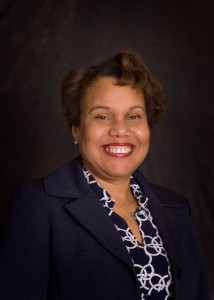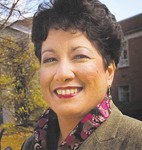2011 Speakers (New!)
Linda Aldoory, Ph.D.
Invited Panel: Let’s talk: Health Literacy and Cultural Competency Researchers Working Together
Monday, October 17 – 1:30-3:00pm
Dr. Aldoory studies health communication, specifically women’s health, and gender and diversity in health public relations. Her current research focuses on how public health campaigns and mass media affect health attitudes and decision making for women and adolescents. She has been published in the top ranked journals such as Journal of Communication and Health Communication, and is a research consultant for the CDC, FDA, and the Department of Homeland Security. Dr. Aldoory is former editor of the Journal of Public Relations Research. She is also a fellow in the university’s Academy of Excellence in Teaching and Learning and a former Lilly Fellow for Teaching Excellence. Courses she typically teaches include public relations theory and writing, health communication, and qualitative research methods.
Current research projects are multi-methodological and are working towards developing theory to explain the ability of public health campaigns to improve health decision making. She is analyzing the cultural and socioeconomic factors that impact women’s and teen’s health and everyday lives.
Barbara Bayldon, MD
Monday, October 17 – 12:00-1:30pm
Interest Group: Pediatrics
Dr. Bayldon is an Assistant Professor of Pediatrics at Northwestern University. She received her MD from Temple University and completed her residency at Northwestern. Dr. Bayldon is primarily involved in health literacy advocacy, research and incorporation of this into clinical care, as well as medical home and medical education about the medically complex child.
Cindy Brach, MPP
Monday, October 17 – 10:30am-12:00pm
Moderator, Plenary Session I: Health Literacy Measurement Across the Lifespan
Cindy Brach is a Senior Health Policy Researcher at the Agency for Healthcare Research and Quality (AHRQ). She conducts and oversees research on health literacy, cultural and linguistic competence, chronic care, and Medicaid and State Children’s Health Insurance Program (SCHIP). Cindy leads AHRQ’s health literacy activities, coordinating AHRQ’s work in developing measures and improving the evidence base, and integrating health literacy activities throughout AHRQ’s portfolios and serves on the Institute of Medicine (IOM) Health Literacy Roundtable. Cindy’s health literacy projects have included the development of a Health Literacy Universal Precautions Toolkit, CAHPS® Item Set for Addressing Health Literacy, and the AHRQ Informed Consent and Authorization Toolkit for Minimal Risk Research. Cindy is also AHRQ’s point person for cultural competence.
She has developed a research agenda for cultural competence, and is currently overseeing projects to improve cultural competence in hospitals. Cindy participates in the Prevention/Care Management Portfolio. Her work in the chronic care area includes commissioning the development of Integrating Chronic Care and Business Strategies in the Safety Net: A Toolkit for Primary Care Practices and Clinics, and overseeing a study of its implementation. Cindy’s work on Medicaid and SCHIP notably included the Child Health Insurance Research Initiative (CHIR) a public-private partnership. She currently oversees the National Evaluation of CMS CHIPRA Quality Demonstration Grants.
Cindy has published in journals such as Health Affairs, Medical Research and Review, American Journal of Health Behavior, Health Care Financing Review, and Journal of Health Care for the Poor and Underserved. Cindy’s earlier experience includes serving as a mental health policy research director, a welfare reform consultant and provider of technical assistance, a SState-level administrator, and a municipal policy analyst. Cindy received her Master of Public Policy degree from the University of California, Berkeley, where she was also advanced to Ph.D. candidacy.
Angela Brega, Ph.D.
Monday, October 17 – 1:30-3:00pm
Invited Panel: Health Literacy and Health Care Quality
Dr. Brega is an Assistant Professor with the Centers for American Indian and Alaska Native Health (CAIANH) in the Colorado School of Public Health. Dr. Brega is a social psychologist with extensive training and expertise in measurement, health outcomes, and health psychology. Much of her work has focused on evaluating patient outcomes as a means of assessing quality of care. Since joining CAIANH in September 2008, her work has focused on interventions to improve health outcomes among American Indian and Alaska Native (AI/AN) populations, focusing primarily on outcomes related to diabetes, cardiovascular disease, and oral health. She has particular interest in understanding the implications of health literacy for diabetes and cardiovascular outcomes among AI/ANs with diabetes, and is working to develop a theoretical framework through which the impact of health literacy on clinical outcomes can be understood.
For the Special Diabetes Program for Indians Healthy Heart Project, she has conducted extensive psychometric analyses to evaluate the performance characteristics of measures of health literacy and disease knowledge. Dr. Brega also has a strong background in research addressing neuropsychological and psychosocial factors that influence health outcomes. Much of her work in this area has addressed the implications of limitations in health literacy and deficits in executive cognitive functioning for health behavior and clinical outcomes.
Erica Breslau, PhD, MPH
Monday, October 17 – 10:30am-12:00pm
Introduction, Plenary Session I: Health Literacy Measurement Across the Lifespan
Erica Breslau, Ph.D. is a program director in the Applied Cancer Screening Research Branch, Behavioral Research Program, Division of Cancer Control and Population Sciences at the National Cancer Institute. In this position, she maintains a national portfolio of grants in behavioral, social and public health research. Her expertise is in breast and colorectal cancer screening, and in this capacity serves as a primary interface between NCI investigators conducting research in this area. Her research is in psychosocial and contextual influences of different screening modalities, colorectal cancer screening in primary care practices, the translation and dissemination of evidence-based interventions into community practice, and the reduction of health disparity gaps in cancer screening, especially with rarely and unscreened populations.
Prior to joining the NCI in January 2002, Dr. Breslau monitored and directed behavioral, public health, community based, and evaluation research for 18 years. Her past experience working with the Department of Defense addressed women’s health issues that influence infectious diseases in gynecological cancers among military women. She evaluated emerging computerized technologies that delivered tailored communication messages with specialized rapid-deployment military personnel.
Dr. Breslau received a Masters in Public Health from Tulane University, School of Public Health and Tropical Medicine in 1988, and a Doctorate in Public Health in 2001 from The Johns Hopkins Bloomberg School of Public Health.
Invited Panel: Let’s talk: Health Literacy and Cultural Competency Researchers Working Together
Monday, October 17 – 1:30-3:00pm
Olivia Carter-Pokras, Ph.D., Associate Professor in Epidemiology at the University of Maryland College Park-School of Public Health, has conducted health disparities research in the Federal government and academia for 3 decades. The previous Director of the Division of Policy and Data in the DHHS Office of Minority Health; Dr. Carter-Pokras has been recognized by the Governor of Maryland, Surgeon General, Assistant Secretary for Health, and Latino Caucus of the American Public Health Association for her career achievements to improve Latino health care quality, and racial and ethnic data. Her research has played a critical role in national recognition of health disparities experienced by Latinos.
Dr. Carter-Pokras is the Principal Investigator for a NIH/NCMHD conference grant to support an annual meeting of the National Consortium for Multicultural Education for Health Professionals, and a NIH/NICHD R21 grant to study Oral Health of Latino and Ethiopian Children and Their Mothers. She conducts health assessments of Latinos in Maryland and the District of Columbia in close partnership with local government and community based organizations, and is the research director for the CDC-funded University of Maryland Prevention Research Center. Dr. Carter-Pokras has published more than 52 peer-reviewed journal articles, 12 book chapters, 1 book and 8 reports which have been cited over 1050 times. Recognized areas of expertise according to BiomedExperts include Hispanic Americans, Socioeconomic Factors, Health Services Accessibility, Health Surveys, Health Status Disparities, and Communication Barriers.
Dr. Carter-Pokras is an elected fellow of the American College of Epidemiology, and serves on the Policy Committee of the American College of Epidemiology, the Education Board of the American Public Health Association, and the Institute of Medicine’s Committee on Advancing Pain Research, Care, and Education. Dr. Carter-Pokras lectures on epidemiologic methods, chronic disease epidemiology, cultural competency and health disparities to public health, dental and medical students.
Meredith Coles, Ph.D.
Monday, October 17 – 1:30-3:00pm
Invited Panel: Exploring Literacy in Mental Health and Illness
Dr. Coles is an Associate Professor of Psychology at Binghamton University and the Director of the Binghamton Anxiety Clinic. The BAC was established in 2004 to serve members of the greater Binghamton community and is devoted to treatment, research and training.
Dr.Coles’ work focuses on enhancing the functioning of individuals with obsessive-compulsive disorder (OCD) and social phobia. Multiple perspectives and methods are drawn from to address this goal including both basic and applied research. Through the Binghamton Anxiety Clinic she conducts research examining outcomes from cognitive-behavioral therapy for these disorders, and predictors of and mechanisms of change. Clinical, unselected, and high-risk samples are utilized to examine risk factors for the onset of OCD including cognitive vulnerabilities and childhood experiences. In addition, we are developing a line of work addressing the role of disruptions in sleep/circadian rhythms in OCD. Finally, clinical, community and national samples are used to investigate barriers to treatment-seeking for anxiety disorders, particularly the role of low mental health literacy.
John Comings, Ed.D.
Monday, October 17 – 10:30am-12:00pm
Plenary Session I: Health Literacy Measurement Across the Lifespan
John Comings is a Principal International Technical Advisor at the Education Development Center in Newton, MA. Until July 2008, he was Director of the National Center for the Study of Adult Learning and Literacy (NCSALL) and a member of the faculty of the Harvard Graduate School of Education. NCSALL is funded by the U.S. Department of Education as its national research and development center focused on educational programs for adults who have low literacy and math skills, who do not speak English, or who do not have a high school diploma. Before coming to Harvard in 1996, Dr. Comings spent 12 years as Vice President of World Education, a nonprofit agency that supports adult-education projects in Asia, Africa, and the United States. Before that he worked on education and research projects in Indonesia and Nepal and was a Peace Corps volunteer in Nepal.
His research and writing is concerned with the impact of adult-literacy programs and the factors that lead to that impact in the United States and in Third World countries and on factors that support student persistence in adult-education programs in the U.S. He has been and editor of The Review of Adult Learning and Literacy and author of Building a Level Playing Field, Establishing and Evidence-based Adult Education System, and New Skills for a New Economy. Dr. Comings holds a doctorate in education from the University of Massachusetts at Amherst.
Cheryl D. Courtlandt, MD
Monday, October 17 – 1:30-3:00pm
Invited Panel: Health Literacy and Health Care Quality Panel
Prior to joining the Carolinas Healthcare System Dr. Courtlandt was an attending from 1988-1996 in the Department of Pediatrics, Division of General Pediatrics and Division of Emergency Medicine at Bellevue Hospital Center, New York, NY. From 1990-1996 she served in several capacities to include, Course Director and Assistant Professor Pediatrics at the New York University School of Medicine. Dr. Courtlandt received her medical degree from Rutgers Medical School, Piscataway, New Jersey and continued post-graduate training in research methodology, epidemiology and statistical analysis at New York University and Tufts University. She also has completed courses in advanced quality improvement methodology and data analysis.
Dr. Courtlandt in her capacity as co-director of CAPE, directs and chairs numerous committee involved in process improvement and patient safety. She has served as physician champion and as a coach for several multidisciplinary improvement efforts, both internal and external to the Department of Pediatrics. She is a member of the National Medical Association, Ambulatory Pediatric Association and American Academy of Pediatrics. Dr. Courtlandt is an active lecturer, workshop leader, and published author.
Dr. Courtlandt’s areas of interest include health literacy, asthma, community medicine, school health, quality improvement initiatives and methodology, research methodology and data analysis. Her most recent publication is as a contributor to the journal “Pediatric Clinics of North America” in the issue entitled Pediatric Quality.
Darren DeWalt, MD, MPH
Monday, October 17 – 1:30-3:00pm
Invited Panel: Health Literacy and Health Care Quality
Dr. DeWalt is an Assistant Professor of General Internal Medicine at the University of North Carolina at Chapel Hill. He actively researches self-management interventions for patients with low-literacy and focuses on chronic diseases like diabetes, heart failure, and asthma. His focus is on patient-physician communication and health system design to achieve better outcomes for vulnerable populations. He is the principal investigator at the UNC research site for the Patient Reported Outcomes Measurement Information System (PROMIS) and chair of the Pediatrics Workgroup.
Dr. DeWalt is a former Robert Wood Johnson Clinical Scholar at the University of North Carolina at Chapel Hill. He completed his residency in internal medicine and pediatrics at the University of North Carolina at Chapel Hill where he also served as chief resident in internal medicine. He received his medical degree from the Vanderbilt University School of Medicine.
Dr. DeWalt led the design team and is currently a national improvement advisor for the Improving Performance in Practice (IPIP) program for the boards and specialty societies of internal medicine, family medicine, and pediatrics.
Shalini Forbis, MD, MPH
Monday, October 17 – 12:00-1:30pm
Interest Group: Pediatrics
Dr. Forbis is Associate Professor of Pediatrics at Wright State University Boonshoft School of Medicine and practices at Dayton Children’s Medical Center. She moved there after completing a General Academic Research Fellowship and her Master’s in Public Health at University of Rochester, Rochester NY. She completed medical school as well as a Pediatric Residency in Toledo, OH at the Medical College of Ohio. Her main responsibilities include research, clinical patient care duties and medical education. Her research interests encompass the topic of health disparities in underserved populations with specific interests in health literacy, health care communication and pediatric asthma. Her research interests include parental health literacy, health care communication and pediatric health disparities. She is actively involved with the Academic Pediatric Association, specifically the Health Literacy Special Interest Group. She also participated on the American Academy of Pediatrics’ Health Literacy Project Advisory Committee.
Desiree Lie, MD
Invited Panel: Let’s talk: Health Literacy and Cultural Competency Researchers Working Together
Monday, October 17 – 1:30-3:00pm
Dr. Lie has been Clinical Professor of Family Medicine at the University of California, Irvine for 22 years, a role combining clinical practice, teaching, educational leadership and research. She was also recently appointed to the position of Professor of Medicine at the Duke-National University of Singapore Graduate School of Medicine where she will serve as clinician-educator and advisor for faculty research in education and qualitative studies. She is a clinician-educator active in medical education research and participates on national projects focused on cultural competency, faculty development, preceptor training and health literacy.
Alisa K. Lincoln, MPH, Ph.D.
Monday, October 17 – 1:30-3:00pm
Invited Panel: Exploring Literacy in Mental Health and Illness
Dr. Lincoln is an Associate Professor of Health Sciences and Sociology at Northeastern University. She also holds adjunct appointments at Boston University School of Public Health and in the Division of Psychiatry at Boston Medical Center. She has training in Psychiatric Epidemiology, Sociology and Mental Health Services Research. Her research has focused on public mental health issues. Currently she is conducting research on the role of literacy in the lives and recovery of people with serious mental illness. Many of her projects draw upon the principles of community based participatory research (CBPR).
Lauren McCormack, Ph.D., MSPH
Monday, October 17 12:00-1:30pm
Interest Group: Measurement
Dr. McCormack is the Senior Director of RTI’s Health Communication Program which includes 28 research staff. Her research focuses on promoting informed decision making through effective communication and measuring and evaluating the impact of health-related information on knowledge, attitudes, and behaviors. She has studied a variety of health promotion, public health, and health care topics including cancer, diabetes, and health insurance decision making.
For nearly two decades, Dr. McCormack has led or participated in studies for AHRQ, CDC, NCI, FDA, CMS, and RWJF. As part of an NIH-R01, Dr. McCormack and her team developed a survey instrument to measure health literacy using a skills-based approach. Previously, she developed an instrument to measure health insurance literacy for the Medicare population and led a study to develop measures of patient-centered communication for cancer care. She is currently leading a CDC project to develop a health literacy index that can be applied to rate the health literacy level of public health communications. For AHRQ, she is refining and expanding their electronic Preventive Services Selector tool which provides USPSTF guidelines to physicians in electronic format. For the Institute of Medicine, Dr. McCormack developed a communication initiative with the goals of fostering broader public understanding of evidence-based medicine and promoting greater clarity around patient roles and responsibilities.
Dr. McCormack has presented her findings at national conferences and published 40 peer-reviewed articles in the following journals: the Journal of Health Communication, Health Services Research, Medical Care, Health Affairs, Medical Decision Making, The Patient– Patient-Centered Outcomes Research, the Journal of Cancer Education, the Journal of Consumer Affairs, and Health Education Research. She is an Associate Editor of the RTI Press and served as a guest editor of the 2010 and 2011 special issues of the Journal of Health Communication that focused on health literacy.
She completed her training at the University of North Carolina at Chapel Hill in the School of Public Health.
Laura Noonan, MD
Monday, October 17 – 1:30-3:00pm
Invited Panel: Health Literacy and Health Care Quality
Dr. Noonan is the Director, Center for Advancing Pediatric Excellence, Department of Pediatrics at the Levine Children’s Hospital (LCH) at Carolinas Medical Center. She is also a Charlotte AHEC Senior Improvement Advisor at Carolinas Medical Center, Charlotte, NC.
Prior to joining the Carolinas Healthcare System in 1994, Dr. Noonan practiced in the greater Charlotte area from 1991-1993. From 1987-1990 she completed a pediatric residency at The University of North Carolina, Chapel Hill, and a chief residency from 1990-1991. From 1991-1992 she was a Clinical Instructor in the Department of Pediatric at the University of North Carolina, Chapel Hill, Chapel Hill, NC. Dr. Noonan received her medical degree from the University of Arizona at Tucson. Additionally, Dr. Noonan currently chairs the LCH Pediatric Quality Assurance/Improvement Committee and the Pediatric Education committee and is a member of the American Academy of Pediatrics and the North Carolina Pediatric Society.
Her areas of interest and expertise include Health Care Quality Improvement methodology and framework both as an author, instructor, and principal investigator. Dr. Noonan’s most recent publication is as a contributor to the textbook “Pediatric Clinics of North America”. She chairs the Carolinas Healthcare System’s Health Literacy Initiative, implementing Health Literacy strategies throughout the system in an IHI style collaborative.
Ana Nunez, MD
Invited Panel: Let’s talk: Health Literacy and Cultural Competency Researchers Working Together
Monday, October 17 – 1:30-3:00pm
Dr. Núñez is an Associate Professor of Medicine at Drexel University, specializing in girls’ and women’s health. She has developed a curriculum for mothers and daughters to explore healthy lifestyle choices. She has also created curriculum for healthcare providers to be better able to address the needs of minority women living with HIV/AIDs. She is the medical director for Drexel University’s Physician Assistant Program.
Dr. Núñez’s research interests are in girls’ and women’s health, minority women’s health and culturally effective care. She conducts research about health sciences, community engagement and health empowerment as well as health literacy. Additionally, she is studying improving health in vulnerable populations through education, and heart health for women.
She is a nationally recognized medical educator in women’s health, curricular reform and cultural competency, and has served as the Principal Investigator in a number of educational and health services research grants in women’s health and culturally effective health care. She has received funding by the U.S. Department of Education Fund for Improvement of Post-Secondary Education Grant for Disseminating Proven Reforms for her work in Women’s Health education.
Guadalupe Pacheco, MSW
Invited Panel: Let’s talk: Health Literacy and Cultural Competency Researchers Working Together
Monday, October 17 – 1:30-3:00pm
Mr. Pacheco serves as a Senior Health Advisor to the Deputy Assistant Secretary for Minority Health, U.S. Department of Health and Human Services. Mr. Pacheco has occupied mid-level and senior level management positions in non-profit, State and Federal government agencies.
In his current capacity as Senior Health Advisor to the Director for Minority Health, Mr. Pacheco assists in developing policies and initiatives to mitigate health disparities that affect racial and ethnic minority communities. He serves a project officer for agency contracts, grants, and other procurement instruments. Moreover, he concurrently staff’s the Office of Minority Health’s Center for Linguistic and Cultural Competence in Health Care and the OMH’s Center for Emergency Preparedness in Underserved Communities portfolios. Under the cultural competency portfolio, Mr. Pacheco served as the project officer for the development of the National Standards for Culturally and Linguistically Appropriate Services in Health Care. He currently manages Cultural Competency E-learning programs for physicians, nurses, and disaster preparedness and crisis response personnel. Additionally, Mr. Pacheco serves on departmental committees that focus on health literacy, limited English Proficiency, workforce development, health information technologies, disaster preparedness, and border health policy issues. Mr. Pacheco received his B.A. and M.S.W. from California State University of Fresno.
Russell Rothman, MD, MPP
Monday, October 17 – 10:30am-12:00pm
Plenary Session I: Health Literacy Measurement Across the Lifespan
Dr. Rothman is an Associate Professor of Internal Medicine and Pediatrics at Vanderbilt, and serves as the Director of the Vanderbilt Center for Health Services Research. Dr. Rothman received his bachelor’s degree from Duke University in 1992, and his MD from Duke in 1996. During this time he also completed a master’s in Public Policy (M.P.P) at the Sanford Institute of Public Policy at Duke. After this, Dr. Rothman remained at Duke where he completed a combined Internal Medicine and Pediatrics residency in 2000. From 2000 to 2002, he served as a Robert Wood Johnson Clinical Scholar at the University of North Carolina in Chapel Hill. In 2002, he joined the faculty at Vanderbilt. Dr. Rothman’s current research focuses on improving care for adult and pediatric patients with diabetes, obesity and other chronic diseases. He has been funded by the NIH, American Diabetes Association, the Pfizer Clear Health Communication Initiative, and other sources to examine the role of literacy and numeracy in patients with diabetes and obesity. He is currently the Principal Investigator on several studies addressing literacy and health communication in obesity prevention and diabetes. He has served as a reviewer on the NIH Special Emphasis Panel on Health Literacy and the Pfizer Health Literacy Fellowship Awards. Dr. Rothman has been a Pfizer Visiting Professor in Health Literacy at the University of Pittsburgh and the University of Alabama at Birmingham. Dr. Rothman also currently serves as Chief of the Vanderbilt Med/Peds Section, Co-Director of the Vanderbilt Community Engaged Research Core of the Vanderbilt Institute of Clinical and Translational Research (VICTR), and the Associate Director of the Vanderbilt Center for Diabetes Translational Research.
Rima Rudd, Sc.D., MSPH
Monday, October 17 – 8:30-10:00 a.m.
Keynote I: “Health Literacy: Insights for Research, Practice and Collaboration”
Dr. Rudd is a Lecturer on Society, Human Development and Health at the Harvard School of Public Health. She holds visiting appointments as the Health Literacy Senior Scholar at the Horowitz Center on Health Literacy at the University of Maryland and as the Professor on Health Literacy in the Faculty of Health and Social Care, London South Bank University. Her research inquiries and policy work focus on literacy-related disparities and literacy-related barriers to health programs, services and care.
Dr. Rudd wrote several reports that helped shape the agenda in health literacy research and practice, including the health literacy chapter of the Health and Human Services report Communicating Health: Priorities and Strategies for Progress (2003). She authored two in-depth literature reviews and served on key committees that helped analyze and shape the field of health literacy: the Institute of Medicine Committee on Health Literacy, the National Research Council Committee on Measuring Adult Literacy, the National Institute of Dental and Craniofacial Research Workgroup on Oral Health Literacy and the Joint Commission Advisory Committee on Health Literacy and Patient Safety. She coded all health-related items in the international surveys for assessments of adult literacy skills enabling the United States, Canada, Australia, New Zealand and other countries to assess national health literacy skills.
Dr. Rudd has received national and international awards for her work in health literacy and is considered a leader in this growing field of research and practice.
Janet Shim, Ph.D., MPP
Monday, October 17 – 10:30am-12:00pm
Plenary Session I: Health Literacy Measurement Across the Lifespan
Dr. Shim is Assistant Professor of Sociology in the Department of Social and Behavioral Sciences, at the University of California, San Francisco. Dr. Shim received her AB from Princeton University, her Master’s in Public Policy from the Harvard Kennedy School of Government, and her PhD in Sociology from UC San Francisco. Her past projects have explored epidemiologic and lay accounts of the role of racial, class, and gender differences in the etiology of heart disease, and the increasing routinization of cardiac procedures in late life. Dr. Shim also examines the interactional dynamics of clinical encounters and their consequences. In particular, she has developed the concept of “cultural health capital” (CHC) to hypothesize how a fund of cultural skills, resources, and competencies-unevenly distributed by race and social class-is critical to the ability to effectively engage with clinical providers, access and apply health-related knowledge, and other factors important in managing disease and navigating the health care system. CHC seeks to apply sociological theories of cultural capital to the domain of health care and clinical interactions. Her work has been published in such journals as American Journal of Sociology, Journal of Health and Social Behavior, and PLoS Medicine, and has been supported by the NIH and National Science Foundation, among others.
Barry D Weiss, MD
Monday, October 17 – 1:30-3:00pm
Invited Panel: Exploring Literacy in Mental Health and Illness
Dr. Weiss is a tenured professor in the Department of Family and Community Medicine at the University of Arizona College of Medicine. He is also a faculty member of the Arizona Center on Aging, a professor in the University of Arizona’s Department of Medicine, and an affiliate professor of public health in the College of Health Sciences at the University of Alaska Anchorage. He has been involved in the fields of health literacy and patient-physician communication for much of his professional career. His writings on these topics have been published in the New England Journal of Medicine, the Journal of the American Medical Association, and a variety of other medical journals and books. Dr Weiss wrote the American Medical Association’s Health Literacy Manual for Physicians and a chapter for the Association’s health literacy textbook.
He has served on health literacy advisory committees for the American College of Physicians, the American Medical Association Foundation, the National Cancer Institute, the Joint Commission on the Accreditation of Healthcare Organizations, the American Academy of Family Physicians, and other organizations.
Dr Weiss was a consultant to the Institute of Medicine’s Committee on Health Literacy and wrote a portion of the Institute’s health literacy report. He is also the developer of the Newest Vital Sign health literacy screening instrument.
Dr Weiss is currently the editor of FP Essentials, one of the American Academy of Family Physicians’ largest continuing medical education programs, and associate medical editor of American Family Physician, one of the largest-circulation medical journals in the US. He served for 18 years as editor of Family Medicine, national journal of the Society of Teachers of Family Medicine. Dr Weiss is the author of more than 140 journal articles and several books and book chapters, and he has been the recipient of more than $25 million in educational, research, and service grants and contracts.
Dr Weiss is board certified in family medicine and holds a certificate of added qualification in geriatric medicine.
Matthew Wynia, MD, MPH, FACP
Tuesday, October 18 – 8:30 – 10:00 a.m.
Keynote II: “Making it Easier to Do the Right Thing: Professionalism, Communication and Organizations”
Dr. Wynia is an internist and specialist in infectious diseases. He directs both the Institute for Ethics and the Center for Patient Safety for the American Medical Association (AMA). In these roles, he oversees a wide range of research, education and outreach projects on topics including learning from medical errors, physician professionalism, ethics and epidemics, medicine and the holocaust, inequities in health and health care and how demographics and technology are changing medical practice.
Dr. Wynia is the author of more than 125 published articles, book chapters and reports as well as a book on fairness in healthcare benefit design. His work has been published in the New England Journal of Medicine, JAMA, Health Affairs and other leading medical and ethics journals. He is contributing editor for bioethics and public health at the American Journal of Bioethics. He has been a guest on ABC News Nightline, the BBC World Service, NPR and other programs. In addition to his work at the AMA, Dr. Wynia is a past president of the American Society for Bioethics and Humanities (ASBH) and has chaired the Ethics Forum of the American Public Health Association (APHA) and the Ethics Committee of the Society for General Internal Medicine (SGIM). He cares for patients at the University of Chicago Hospital, where he is a Clinical Assistant Professor of Medicine in the Division of Infectious Diseases.





















